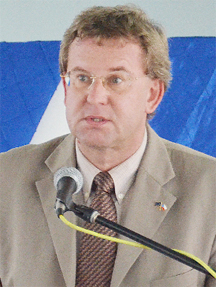Land connection of Guyana, Brazil and Suriname would be the focus of Europe’s future investment in developing the Guianas, according to European Union (EU) Ambassador Robert Kopecký, who yesterday appealed for the states to begin engagements to lay the foundation for the process.
“In terms of the future of our development cooperation, it is every day more obvious that the best way of programming the 11th European Development Fund in the region of the Guianas would be building infrastructure projects (mainly bridges and roads) that would connect this part of South America with the dynamically developing rest of it,” said Kopecký, Head of the EU Delegation to Guyana, Suriname, Trinidad and Tobago and for the Dutch Overseas Countries and Territories, in his Europe Day Message.

Kopecký urged state authorities to engage with the EU and other major national, regional and international players to start to discuss the land connection, in order to boost regional interconnectivity and to develop local economies by providing them with competitive access to the national and foreign markets.
In addition, Kopecký also identified the pursuit of renewable energy, going hand-in-hand with effective protection of the environment, as another area for future cooperation. “Let’s together maintain the Guyanese hinterland as pristine as it is, let’s together control the impacts of the extractive industry on the environment and let’s together help Georgetown to win back its nickname of Garden City!” he urged.
He also emphasised the need for Georgetown to become not only a formal seat of the Caricom Secretariat and the Cariforum Directorate but also “a real bustling centre” of regional integration—what he dubbed “the Brussels of the Caribbean.” Kopecký noted the country’s four decades-old commitment to integration and recognised former President Bharrat Jagdeo for his tireless integration effort as well as President Donald Ramotar and Foreign Affairs Minister Carolyn Rodrigues-Birkett.
Under the 10th European Development Fund, which covers the period 2008 to 2013, Kopecký said a total of €55M has been allocated to Guyana to contribute to its sector policy on coastal management, including maintenance and strengthening of sea defences, as well as macroeconomic support to implement the Poverty Reduction Strategy Paper and achieve the Millennium Development Goals. He called the implementation of the mangrove Restoration Project and some of the non-state actors and local authorities funded through grants sheer success stories.
He also noted that as part of development cooperation, by way of its budget support programme the EU was committed to making about €160M available for the period 2007 to 2013 to modernise the sugar industry in Guyana. The figure, he noted, was second biggest committed by the EU in the world after Mauritius.
Kopecký, who has been here for half a year, signalled that relations between the EU and Guyana are growing closer. Rather than two parallel monologues, he explained, a “real dialogue” is being established based on the needs of the country on one side and the EU’s financial and know how possibilities on the other. “…In the every day more competitive internal environment in the European Union, where the calls for accountability, efficiency and meaningfulness of the European doing in the world are stronger and stronger, this is the only way ahead,” he said.
In particular, Kopecký noted that the EU has intensified its support to Guyanese and regional businesses, with the aim of boosting bilateral trade.
Europe is the market for an estimated one third of Guyana’s exports, he noted, while pointing out that “great business opportunities” arising from the “brisk growth” of the country’s gross Domestic Product (GDP) have not been adequately tackled as yet.




